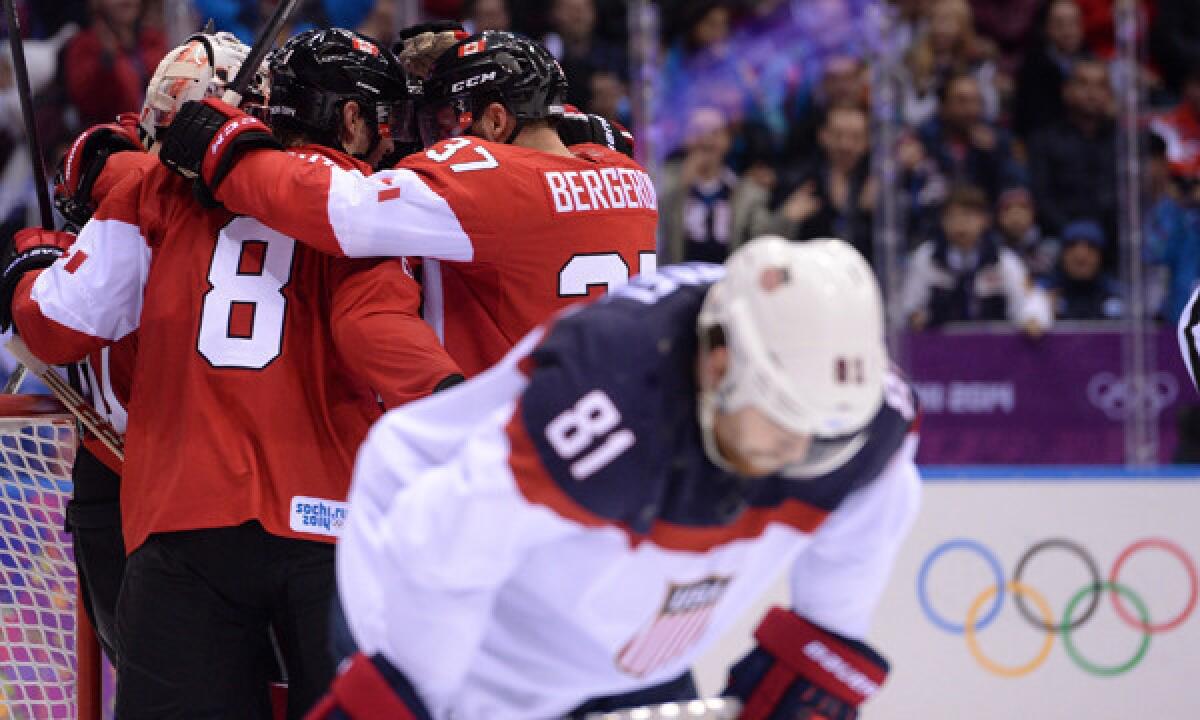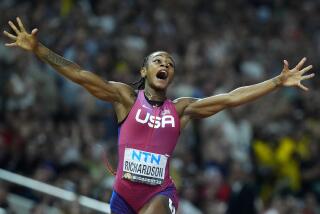Canada stifles USA in Olympic men’s hockey semifinal, 1-0

SOCHI, Russia — The team that bulldozed its way through the Sochi Olympic hockey tournament while averaging five goals a game exited the semifinals meekly, unable to score once.
Team USA’s speed was neutralized and its in-your-face attitude pushed right back in its own face by Canada, which had been pushed to the brink by Latvia — Latvia? — in the quarterfinals and has been subjected to daily roastings from armchair critics back home.
In a dramatic turnaround, Canada raised its game to an art Friday. Goaltender Carey Price made 31 saves and a superb team-wide defensive effort made an early second-period redirection by Jamie Benn stand up for a 1-0 victory over an American team that abandoned the forecheck and rambunctious nature that had been among its greatest strengths.
“You have to line up the moon and stars to win. People don’t believe that in Canada, but it’s the fact,” said Coach Mike Babcock, who guided his team to Sunday’s gold-medal game against Sweden with a chance to become the first men’s team to win two consecutive Olympic titles since the 1984 and 1988 Soviet squads.
The U.S. will face Finland on Saturday for the bronze, a destiny it had never contemplated. “We’ll be thinking about this for a while,” U.S. center David Backes said glumly.
With good reason. U.S defenseman Ryan Suter described the team’s performance as “terrible.” He added, “We didn’t have any energy, we didn’t have a forecheck, we weren’t very good.… We didn’t come out and play.”
In a rematch of the 2010 gold-medal game — won by Canada in overtime in Vancouver — Canada’s strategy and performance were nearly flawless. If the moon and the stars were in line, it was because Babcock’s forwards and defensemen worked together to push the Americans outside and minimize the number of dangerous chances and rebounds Price had to face.
U.S. goalie Jonathan Quick, in a script familiar to Kings fans, made 36 saves but got no offensive support.
“There was some action at both ends of the ice. At the end of the day, their goalie made one more save than we did. That’s the way it goes sometimes,” Quick said.
“We still have an opportunity [Saturday] to win a gold, er, a bronze medal.”
Canada wanted to dictate the pace and own the puck from the start, and it did.
“That’s the main focus when we’re playing against a team like that, that has so much speed,” Ducks and Canada center Ryan Getzlaf said. “The more we can have the puck and control them in the neutral zone it was better for our group.
“We took away their space. They’re a high-scoring team and a high-flying team. You watch them in all their games and they’re scoring a lot off the rush. We got in their face in the neutral zone, which slowed them down.”
Benn, who wasn’t invited to Canada’s orientation camp last summer but played his way onto the team by having a fine season with the Dallas Stars, scored the game’s only goal after Canada won a faceoff in the U.S. zone. Benn got the puck back to defenseman Jay Bouwmeester, who returned it to him with a pass that could have been a shot and was tipped perfectly by Benn.
“It was exciting,” Benn said. “We knew it was going to be a tight match going in. We found a way to get one, our team played great team defense, and our goalie shut the door.”
And opened a window of opportunity for Canada to win its first gold medal in men’s hockey outside of North America since 1952.
“We’ve done half our job now getting there,” Getzlaf said, “and now we’ve got to win it.”
U.S. Coach Dan Bylsma said winning bronze will be his team’s new goal, but no U.S. men’s team has won a medal in Games played outside North America since the 1972 team took silver in Sapporo, Japan.
“They played great, they had the puck a lot and kept it in our end,” U.S. and Chicago Blackhawks winger Patrick Kane said. “They probably did a little bit of what we wanted to do.”
That might hurt most of all.
Twitter: @helenenothelen
More to Read
Go beyond the scoreboard
Get the latest on L.A.'s teams in the daily Sports Report newsletter.
You may occasionally receive promotional content from the Los Angeles Times.





